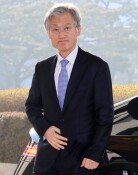Are Xi Jinping and Vladimir Putin pursuing `trustpolitik`?
Are Xi Jinping and Vladimir Putin pursuing `trustpolitik`?
Posted May. 09, 2015 07:13,
At a summit meeting held in Moscow on Friday, President Vladimir Putin of Russia and President Xi Jinping of China announced a joint statement on fostering a comprehensive, strategic and cooperative partnership between the two nations. Some say that the relations between Beijing and Moscow have reached to the point where it could be equivalent to the relations between the U.S. and Japan who have recently opened a new honeymoon period as the two have vowed to bring rebalance to Asia.
China-Russia summit came at a time when leaders of western nations such as the U.S. and the U.K. have boycotted a military inspection for the 70th anniversary of World War IIs victory in protesting against Russias annexation of Crimea. On the verge of economic crisis due to sanctions imposed by Western countries, Russia is seeking its solution from the relations with China. On the other hand, China is joining hands with Russia in an effort to stand against the pressure from Washington and Tokyo. In diplomacy, my enemys enemy could be my friend. Having worried about the leakage of technology for S-400 air-to-surface missile, Moscow has recently decided to sell it to Beijing. At the end of May, the two nations will conduct its first joint military exercise in the East China Sea, promoting a full cooperation down the road.
It is not that they have no conflict of interest. President Xi Jinpings concept of Silk Road on land and seas is highly likely to be at odds with national interest of Russia who considers Central Asia its backyard. The change of China-Russia relations clearly shows the changes of geopolitical configuration, which could hardly be called trust-based relationship.
In international politics, national interest is said to be the first criteria for taking action as it is on the harsh reality. I believe, however, that trust is what matters the most in international politics and diplomacy, said President Park Geun-hye at a reception for foreign envoy in Korea on May 6. She might have stressed her personal theory of trustpolitik again, trying to give a word of her personal wisdom but it also sounds like her objection to the media who have recently emphasized utilitarian and practical diplomacy.
Although South Koreas diplomatic policy that is based on trust is wise and well-conceived one, it could be disappointing if it is only for the sake of trust without realistic approach, reckoned Joseph Nye, chair-professor at Harvard University. President Parks trustpolitik argues that if a country displays its trustworthiness to the other nation, the relations would be brought to the higher level. It, however, has failed to bring the trust process in Korean Peninsula and Northeast Asia Peace and Cooperation Initiative to the next level. There is no permanent enemy or ally in diplomacy. National interest, however, is immortal. Having lost its direction while only stressing moral principles, Koreas diplomacy needs to have practical insight that could bring about national and practical interests in order to live up to its genuine cause. Its not that China and Russia went to their honeymoon because they truly love each other.





![[천광암 칼럼]장동혁은 대체 왜 이럴까](https://dimg.donga.com/c/138/175/90/1/wps/NEWS/IMAGE/2026/02/22/133399127.1.jpg)

